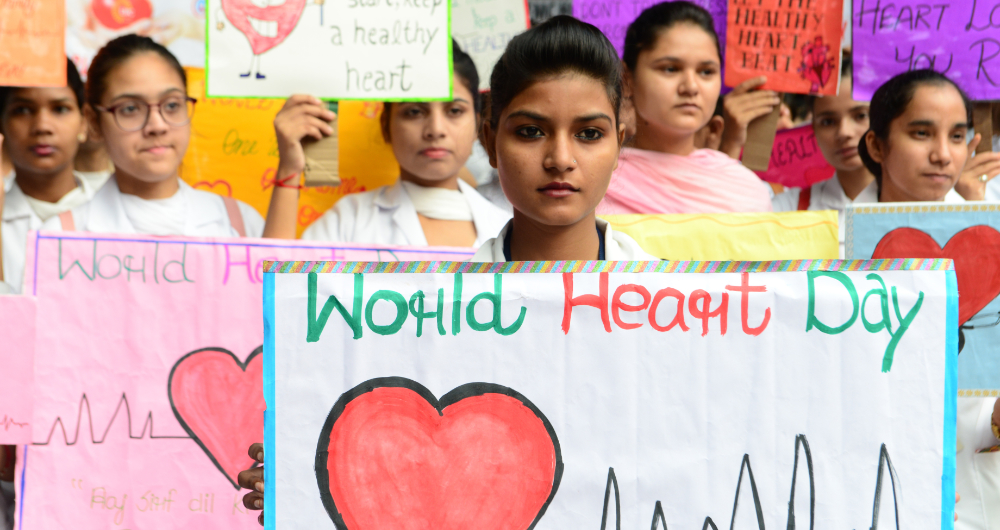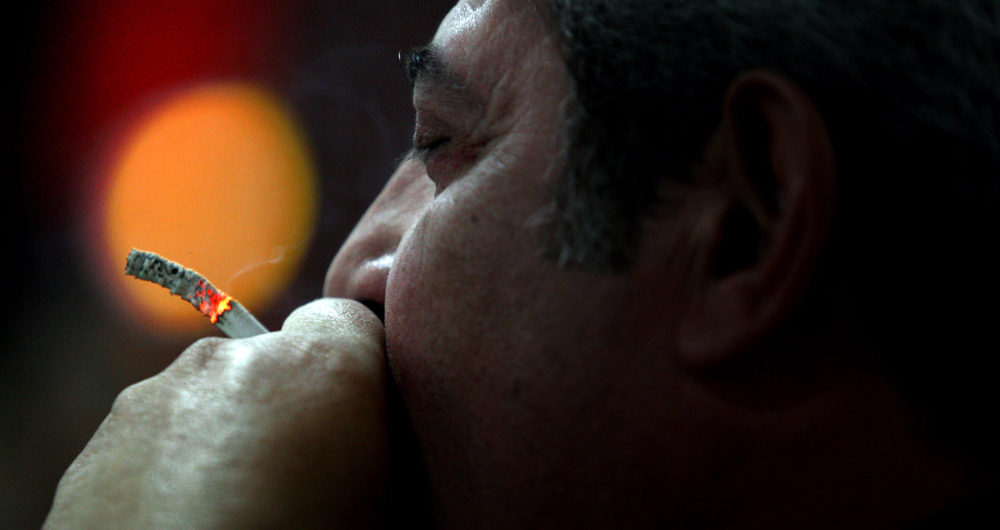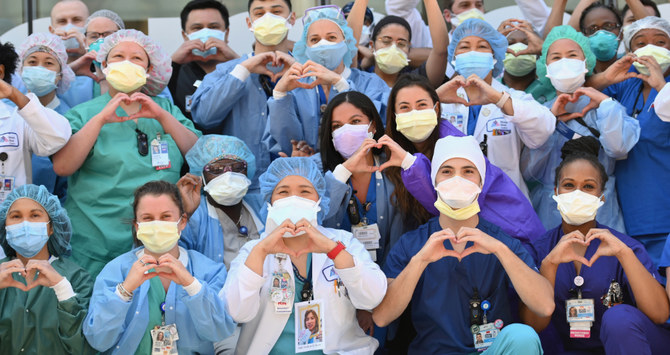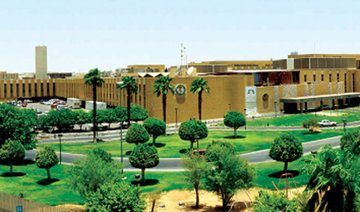DUBAI: Observed each year on Sept. 29, World Heart Day was created to make people aware that cardiovascular disease (CVD) is the planet’s leading cause of death.
This year, with the coronavirus disease (COVID-19) killing more than 91,224 people worldwide so far, the message that people should take responsibility for their heart health has greater meaning than ever before.
According to the World Heart Federation, which launched World Heart Day in 2000, CVD, including heart disease and stroke, is the world’s number-one killer, claiming more than 17.9 million lives each year.
Of these deaths, 80 percent are caused by coronary heart diseases (heart attacks) and cerebrovascular diseases (strokes), mostly affecting people in low and middle-income countries. These diseases also account for nearly half of all deaths by non-communicable diseases (NCD).
Across the Arab region, neglect of heart health is cause for growing concern.

Indian nursing students hold placards on the occasion of World Heart Day during a public awareness event in Amritsar. (AFP)
Poor dietary habits and environmental conditions in fast-growing urban settings mean that even children in the Arab Gulf region are at higher risk of developing CVDs than those in other Arab states.
Take Saudi Arabia, for example. About 5 to 6 percent of the population suffer from CVD, with diabetes and hypertension considered the most common risk factors, according to Dr. Mohammed Balghith, associate professor at King Saud bin Abdul Aziz University for Health Sciences and interventional cardiologist at the National Guard Hospital.
“Many people live a sedentary lifestyle, which means that smoking, obesity and hyperlipidaemia (high levels of cholesterol) are major contributors for people at high cardiovascular risk,” Balghith told Arab News.
The World Health Organization estimates that 54 percent of deaths from NCDs in the Eastern Mediterranean region are caused by CVDs. It attributes the prevalence of such diseases to diabetes, hypertension and the alarming rise of obesity in the GCC, especially among children.
These numbers are even more worrying when one considers the potential long and short-term effects of COVID-19 on the heart, brain and lungs.
Although many claims about the disease still lack definitive proof, multiple studies have concluded that people with CVDs are more vulnerable to developing severe forms of COVID-19.
“One of the unintended consequences of COVID-19 is that people suffering heart attacks and strokes delay seeking medical help in Saudi Arabia,” said Balghith.

Dr. Mohammed Balghith, associate professor at King Saud bin Abdul Aziz University for Health Sciences and interventional cardiologist at the National Guard Hospital.
“We have noticed a decrease in the number of patients with CVDs during the current pandemic as a result of the lockdowns and because so many patients are afraid of visiting the hospital during this time. This is very alarming because delaying medical help can result in even worse outcomes.”
Cardiac death is largely preventable if an individual experiencing a heart attack is taken to hospital in time for treatment, said Balghith.
“It is truly disheartening to see this … especially since the risk of death from an untreated heart attack is 10 times higher than from COVID-19,” he added.
This trend leads to “an unnecessary loss of life,” he said, while urging heart patients in Saudi Arabia to visit their local hospital, where the risk of COVID-19 infection has been minimized for heart attack and stroke patients.

Air pollution and smoking remain major predictors of an increase in early cardiovascular diseases worldwide. (AFP)
However, despite increased efforts to spread awareness about the nature of heart diseases during the pandemic, many people are skipping voluntary visits to the hospital.
To be certain, research on the effects of COVID-19 on the heart is still a work in progress.
“Data is still early but studies have shown that three-fourths of people infected with COVID-19 have residual changes on cardiac magnetic resonance imaging, even though they may have been minimally symptomatic,” Dr. Stephen Kopecky, cardiologist at the Mayo Clinic, told Arab News.
While the long-term impacts of COVID-19 remain “unknown,” Kopecky said the virus could manifest in the heart by causing myocarditis (injury to muscles tissues of the heart), pericarditis and decreased left ventricular systolic function, with arrhythmia identified as a secondary effect.
“The primary effects of COVID-19 are on the lungs, but due to hypoxia (a lack of oxygen), the heart is stressed, and Type 2 myocardial infarctions can occur,” he said.
The good news is that COVID-19 is not guaranteed to cause heart conditions in all recovering patients.
In fact, with the exception of specific cases where patients are susceptible to heart problems caused by common risk factors or genetics, heart health is largely dependent on lifestyle.
“Lifestyle, lifestyle, lifestyle,” said Kopecky, emphasizing the importance of diet and exercise in healthy living.
“The first contributor to heart disease is diet. Intake of processed foods has increased over the past two decades,” he said, pointing in particular to processed fats and carbohydrates.
The second main contributor to cardiovascular disease is a lack of physical activity, with many jobs outside the home likely to be sedentary with increased screen time and little or no vigorous activity, he said.

Dr. Stephen Kopecky, cardiologist at the Mayo Clinic.
Moreover, air pollution and smoking remain major predictors of an increase in early cardiovascular diseases worldwide, despite a slight reduction in cigarette use reported in economically advanced countries.
“Diet and physical activity, avoidance of smoking, and maintenance of normal weight is key to maintaining a healthy heart. Also, stress reduction, adequate sleep and limited alcohol intake is extremely helpful,” Kopecky said.
His advice on World Heart Day coincides with a wider global campaign called #UseHeart, launched to encourage individuals, families, communities and governments to participate in activities that help them take charge of their heart health and spread awareness.
The campaign also supports the unified pledge made by world leaders in 2012 to reduce global mortality from NCDs by 25 percent before 2025.
Non-communicable diseases that lead to cardiovascular disease include obesity, Type 2 diabetes, hypertension and hyperlipidemia.
The campaign’s message is particularly crucial in developing countries, where the prevalence of CVDs is growing.
Kopecky said that heart attacks often afflict those active in the workforce, mostly those under the age of 65.
“In economically advanced countries such as the US, the prevalence of cardiovascular disease has remained about the same. But in the last five years, the incidence of cardiovascular events has actually increased somewhat, and lifespan has decreased compared with what was happening previously,” he said, referring to the reduction in CVD events over the last 50 years.
Additionally, Kopecky said that CVDs generally manifest 10 years earlier in men than in women, often affecting men in their late 50s to early 60s, and women in their late 60s to early 70s.
Yet, regardless of gender, age and environment, at least 80 percent of premature deaths from heart disease and stroke can be avoided.
All things considered, healthcare experts insist it is down to individuals making the right lifestyle choices when it comes to what they eat, how often they exercise, and whether they smoke.
• Twitter: @jumana_khamis





























